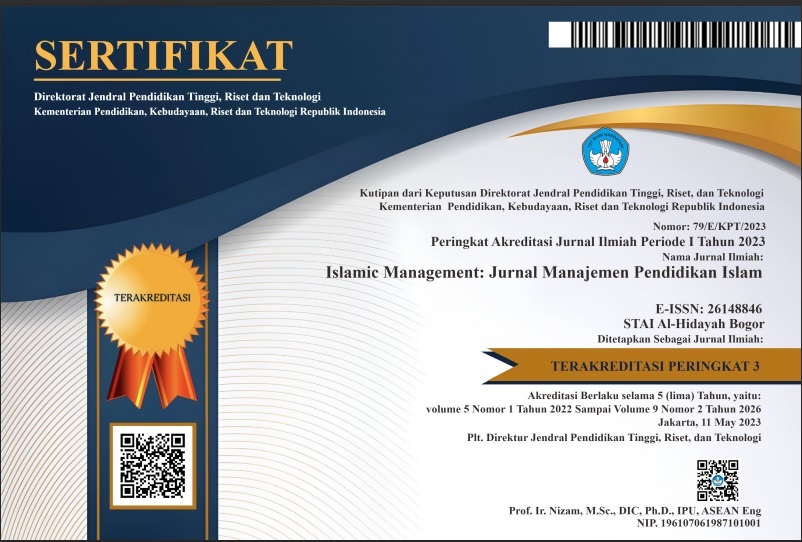ANALYSIS OF THE IMPLEMENTATION OF LEARNING BASED ON QUR'ANIC VALUES IN FOSTERING SOCIAL ETHICS AT SCHOOL
DOI:
https://doi.org/10.30868/im.v8i01.8179Keywords:
Qur'anic Values, Social Ethics, Character Education, School LearningAbstract
This study aims to analyze the implementation of Qur'anic values-based learning in fostering social ethics in schools. Qur'anic value-based learning becomes relevant amidst the challenges of globalization that often erodes moral values, especially among the younger generation. Using qualitative methods, this research explores how Qur'anic values are integrated into the curriculum, teaching methods and social interactions at school. It also discusses the role of teachers as facilitators and role models in instilling Qur'anic values such as honesty, responsibility, caring and tolerance. The results show that the Qur'anic value-based approach is able to shape the character of students who have a high awareness of social ethics, such as mutual respect, solidarity, and involvement in social activities. However, this implementation faces various challenges, including limited teacher understanding, lack of institutional support, and resistance from students. Therefore, this study recommends strengthening teacher training, providing institutional support, and innovating learning methods so that Qur'anic values can be implemented more effectively and sustainably in schools.
References
Al-Attas, S. M. N. (1980). The Concept of Education in Islam: A Framework for an Islamic Philosophy of Education. Kuala Lumpur: ABIM.
Al-Ghazali, A. H. M. (2014). Ihya Ulumuddin (Vol. 1). Jakarta: Amani Library.
Arifin, Z. (2017). Islamic Education in Curriculum Perspective. Jakarta: Rajawali Press.
Chotib, Moch, Babun Suharto, Optimization of human capital development on economic growth and poverty in east java, International journal of scientific & technology, 2019.
Dewey, J. (2004). Democracy and Education: An Introduction to the Philosophy of Education. New York: Dover Publications.
Hasan, L. (2015). Character Education Based on Qur'anic Values. Bandung: Faithful Library.
Ministry of Education and Culture (2013). Curriculum 2013: Concept and Implementation. Jakarta: Indonesian Ministry of Education and Culture.
Moleong, L. J. (2018). Qualitative Research Methodology. Bandung: Teenage Workshop.
Nata, A. (2012). Capita Selekta of Islamic Education: Contemporary Issues on Islamic Education. Jakarta: Rajawali Press.
Supriadi, The Role of Madrasah Heads and Guidance and Counseling Teachers in Improving student skills through Communication information centers (PIKR), Journal of Counseling and Education, 2022.
Tilaar, H. A. R. (2002). Education, Culture, and Indonesian Civil Society. Bandung: Teenage Workshop.
Zuhdi, M. (2008). Islamic Education and Modernization in Indonesia. Jakarta: PT RajaGrafindo Persada
Downloads
Published
How to Cite
Issue
Section
Citation Check
License
Copyright (c) 2025 Nuri Iza Muharomah, Moch Chotib, Supriadi Supriadi

This work is licensed under a Creative Commons Attribution-ShareAlike 4.0 International License.
Authors who publish with this journal agree to the following terms:
- Authors retain copyright and grant the journal right of first publication with the work simultaneously licensed under a Creative Commons Attribution License that allows others to share the work with an acknowledgment of the work's authorship and initial publication in this journal.
- Authors are able to enter into separate, additional contractual arrangements for the non-exclusive distribution of the journal's published version of the work (e.g., post it to an institutional repository or publish it in a book), with an acknowledgment of its initial publication in this journal.
- Authors are permitted and encouraged to post their work online (e.g., in institutional repositories or on their website) prior to and during the submission process, as it can lead to productive exchanges, as well as earlier and greater citation of published work (See The Effect of Open Access).






